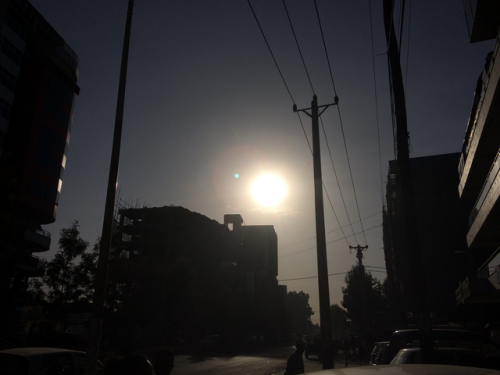Grieving a Stranger
My parents came to Canada as refugees in the late ’80s for better opportunities and to escape Ethiopia’s hellish dictatorship. Though I cannot know the extent of their struggles, I can speak of th... Read more
Remind Them
Colour: forever reside in my blood will keep me on holy ground colour that lived war inside of her. War: the goodbye kisses, tangible on cheek three years on nothing left to go back too. Hom... Read more
Two Movements
I From the terrace before six I see a train crossing, Three cars long—“That’s it?” Passing in no time at all. I linger for the evening commuter; longer, heavier, humi... Read more
Why Do the Fare Inspectors Look Armed?
Every LRT car I hop into will visit Conestoga Station and Fairview Station, even if I don’t witness them. Even if I’ll never truly know for sure. I keep the volume in my headphones low enough that... Read more
Three Poems
Untitledmy mother is a pile of dust between two bricks unable to be condensed to a finer powder she sleeps in her ashtray next to the cigarettes that numb her I walk through the door just make a good ... Read more
Tiles
For Indigenous peoples across Turtle Island, the pandemic deepened pre-existing inequities. The aid that settler-colonial systems offered did not account for (or value) the importance of physical and spiritual spaces for Indigenous communities. Locally, urban Indigenous youth who were just beginning to learn about their culture were suddenly denied access to spaces they needed in order to be in relationship with each other and with the land. Building relationships with the land and with each other in a face-to-face way is an important part of reconnection and healing; removing these connections deeply impacted Indigenous youth and made it necessary to adapt art projects accordingly. To navigate this, Textile supported Pins and Needles Fabric Company, an Indigenous inter-arts company in Waterloo Region, in co-designing an art program with Indigenous youth. Through online talking circles and in-person meetings with appropriate physical distancing, youth considered the following questions: How is Indigeneity (re)claimed or denied during this pandemic? How does physical distancing and self-quarantine impact relationships to the land and to the community? Based on conversations on how youth wanted to express themselves, participants were delivered art-kits containing supplies to make tile art on wood panels to respond to these questions. The following feature shares artwork from two of the seven youth who engaged in this program. Read more

Grieving a Stranger (Digital Storytelling Workshop)
My parents came to Canada as refugees in the late ’80s for better opportunities and to escape Ethiopia’s dictatorship. Though I cannot know the extent of their struggles, I can speak of their consequences... Read more

